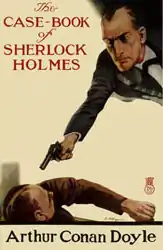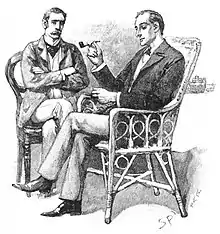The Case-Book of Sherlock Holmes
The Case-Book of Sherlock Holmes is the final set of twelve (out of a total of fifty-six) Sherlock Holmes short stories by Arthur Conan Doyle first published in the Strand Magazine between October 1921 and April 1927.
 Dust-jacket illustration of the first edition of The Case-Book of Sherlock Holmes | |
| Author | Arthur Conan Doyle |
|---|---|
| Country | United Kingdom |
| Language | English |
| Series | Sherlock Holmes |
| Genre | Detective fiction |
| Publisher | John Murray |
Publication date | 1927 |
| Media type | Print (hardback) |
| Pages | 320 pp |
| Preceded by | His Last Bow |
| Text | The Case-Book of Sherlock Holmes at Wikisource |
Title of collection
The first British edition of the collection, published by John Murray, and the first American edition, published by George H. Doran Co., were both published in June 1927.[1] However, they had slightly different titles. The title of the British collection was The Case-Book of Sherlock Holmes (hyphenated "Case-Book"), whereas the title of the American edition was The Case Book of Sherlock Holmes ("Case Book" as two words).
Further confusing the issue of the title, some later publishers released the collection under the title The Casebook of Sherlock Holmes ("Casebook" as a single word).
Contents
The first edition of The Case-Book, published by John Murray in 1927, does not present the stories in the order in which they were published:[2]
Copyright history and challenges
The copyrights for Doyle's Sherlock Holmes stories expired in 1980 in Canada and the United Kingdom. In the United States, the only Sherlock Holmes works by Doyle still protected by copyrights are six of the twelve short stories from The Case-Book. The first six stories ("The Adventure of the Mazarin Stone", 1921; "The Problem of Thor Bridge", 1922; "The Adventure of the Creeping Man", 1923; "The Adventure of the Sussex Vampire", "The Adventure of the Three Garridebs" and "The Adventure of the Illustrious Client", all 1924) are already in the public domain since they were published before 1925. The other stories will enter the public domain on 1 January of the year after the 95th anniversary of each story's publication: 1 January 2022 for "The Adventure of the Three Gables", "The Adventure of the Blanched Soldier", "The Adventure of the Lion's Mane" and "The Adventure of the Retired Colourman"; 1 January 2023 for "The Adventure of the Veiled Lodger" and "The Adventure of Shoscombe Old Place".
The Conan Doyle Estate Ltd. claim they hold the American copyrights. The company has a web page setting out its views about other claimants to those rights. For background, see a note by Peter Blau, January 2011.[11]
As 2013 came to an end, the United States District Court for the Northern District of Illinois handed down a ruling about copyright protection, not for the stories themselves, but for the characters of Holmes and Watson. The defendant in the case was Conan Doyle Estate Ltd. The plaintiff was well-known Sherlockian editor, and Los Angeles entertainment lawyer, Leslie S. Klinger. In the case of Klinger vs. Conan Doyle Estate Ltd.,[12] the court ruled that the Holmes and Watson characters as described in the "story elements" that stem from most of the stories—those published before 1924—are in the public domain.[11]
Literary significance and reception
Although some of the stories are comparable with Doyle's earlier work, this collection is often considered a lesser entry in the Sherlock Holmes canon. David Stuart Davies has commented that "The Adventure of the Creeping Man" "veers towards risible science fiction"; in the 1974 novel The Seven-Per-Cent Solution, author Nicholas Meyer's Watson claims that this entry, as well as three others from the Case-Book ("The Mazarin Stone", "The Three Gables" and "The Lion's Mane"), are forged "drivel". Kyle Freeman also suggests that "The Mazarin Stone" and "The Three Gables" may not be Conan Doyle's work, stating that "[a]lmost nothing about either of "The Mazarin Stone" or "The Three Gables" has the true ring of Conan Doyle's style about them."[13]
Three stories of the collection are not narrated by Dr. Watson, as most Sherlock Holmes stories are. "The Adventure of the Mazarin Stone" is narrated in the third person, since it was adapted from a stage play in which Watson hardly appeared. "The Adventure of the Blanched Soldier" and "The Adventure of the Lion's Mane" are both narrated by Holmes himself, the latter being set after his retirement.
Adaptations
Some series have featured adaptations of all the stories in The Case-Book of Sherlock Holmes, including the radio series The Adventures of Sherlock Holmes (1930–1936)[14] and the later radio series The New Adventures of Sherlock Holmes (1939–1950).[15] All but two of the stories in the collection were dramatised for radio as part of the BBC Sherlock Holmes 1952–1969 radio series.
The stories in the collection, except "The Blanched Soldier", "The Lion's Mane", and "The Retired Colourman", were adapted into episodes of the Granada television series (1984–1994). "The Mazarin Stone" and "The Three Garridebs" were combined for one episode, and elements of "The Veiled Lodger" were incorporated into the Granada adaptation of "The Noble Bachelor".[16] The Case-Book of Sherlock Holmes was adapted for BBC Radio 4 in 1994–1995 as part of the Sherlock Holmes 1989–1998 radio series.[17] All the stories in the collection were adapted as episodes of the radio series The Classic Adventures of Sherlock Holmes (2005–2016).[18] Other adaptations of stories within the collection have also been produced.
Notes
- Cawthorne, Nigel (2011). A Brief History of Sherlock Holmes. Running Press. p. 151. ISBN 978-0762444083.
- Redmond (2009), p. 34
- Redmond (2009), pp. 34–35
- Pugh (2011), p. 169
- Redmond (2009), p. 35
- Pugh (2011), p. 170
- Pugh (2011), p. 166
- Redmond (2009), p. 36
- Pugh (2011), p. 168
- Redmond (2009), p. 37
- "Copyright Notes on the ownership of the Sherlock Holmes stories". Sherlockian.Net. Archived from the original on 6 February 2015. Retrieved 28 December 2018.
- "No. 14-1128 Leslie S. Klinger v. Conan Doyle Estate, Ltd" (PDF). 2014-10-30. Archived from the original (PDF) on 2014-10-30. Retrieved 2020-06-17.
- Freeman, Kyle. "Introduction". The Complete Sherlock Holmes. 2: 35. ISBN 978-1-59308-040-2.
- Dickerson, Ian (2020). Sherlock Holmes and His Adventures on American Radio. BearManor Media. p. 49. ISBN 978-1629335087.
- Dickerson, Ian (2020). Sherlock Holmes and His Adventures on American Radio. BearManor Media. pp. 86, 88–90, 96–97, 102, 104. ISBN 978-1629335087.
- Barnes, Alan (2011). Sherlock Holmes on Screen. Titan Books. pp. 21–23, 41, 59, 106, 114–115, 152–153. ISBN 9780857687760.
- Bert Coules. "The Casebook of Sherlock Holmes". The BBC complete audio Sherlock Holmes. Retrieved 6 December 2020.
- Wright, Stewart (30 April 2019). "The Classic Adventures of Sherlock Holmes: Broadcast Log" (PDF). Old-Time Radio. Retrieved 6 December 2020.
References
- Redmond, Christopher (2009). "The Case-Book of Sherlock Holmes". Sherlock Holmes Handbook (Second ed.). Dundurn. pp. 34–36. ISBN 978-1-77070-592-0. Retrieved 2018-02-16 – via Google Books.
- Pugh, Brian W. (2011). A Chronology of the Life of Arthur Conan Doyle. Andrews UK. ISBN 978-1-78092-199-0. Retrieved 2018-02-16 – via Google Books.
External links
- The Case-Book of Sherlock Holmes at Faded Page (Canada)
 The full text of "The Adventure of the Mazarin Stone" at Wikisource
The full text of "The Adventure of the Mazarin Stone" at Wikisource The full text of "The Problem of Thor Bridge" at Wikisource
The full text of "The Problem of Thor Bridge" at Wikisource
